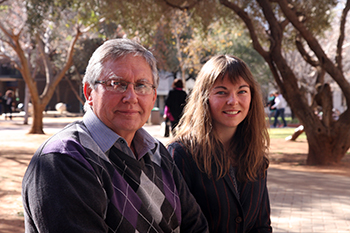Latest News Archive
Please select Category, Year, and then Month to display items
12 October 2020
|
Story Dr Cindé Greyling
|
Photo Supplied
 Exercise and nutrition can work wonders for your mental health – you don’t even have to ‘feel like’ or ‘enjoy’ moving around and eating well for it to work – it does its thing anyway.
Exercise and nutrition can work wonders for your mental health – you don’t even have to ‘feel like’ or ‘enjoy’ moving around and eating well for it to work – it does its thing anyway.
Nowadays, people talk about mental health like it is the common cold – which is good! But do you know what it really means? Being mentally healthy does not only refer to the absence of a mental illness but includes your emotional and social well-being. One would almost want to add physical well-being too, since a healthy body does indeed support a healthy mind. However, since so many people consider themselves ‘mental health experts’, some myths have been sold as truths.
Myth #1 – You are doomed.
Nope. Never. You are never doomed. There is always help. Mental-health therapies range from self-help, talk therapy, medication, to hospitalisation in some cases. Somewhere on this spectrum of treatments, there will be something that works for you. But you must be willing to get the help and do the work. For starters, exercise and nutrition can work wonders – you do not even have to ‘feel like’ or ‘enjoy’ moving around and eating well for it to work – it does its thing anyway.
Myth #2 – It won’t affect you.
It may. Research suggests that one in five people may suffer from a mental illness at some point in their lives. Being well now does not mean that it will stay that way. Biological and environmental factors both impact your mental health. Hopefully not, but at some point, you may experience an event that affects your mental health.
To remain integrated in a community is always beneficial
for anyone suffering from a mental or physical condition.
Myth #3 – Someone struggling with mental health must be left alone.
Hardly! To remain integrated in a community is always beneficial for anyone suffering from a mental or physical condition. You do not need to fix them, but to remain a friend. Continue to invite them, even if they decline. Do not judge, and do not try to understand. Just stay around.
Go and be kind to yourself, and to those around you.
Researcher wins prize for her work to reduce environmental pollution
2016-12-26

Prof Danie Vermeulen, Dean of the Faculty of Natural
and Agricultural Sciences, and Josepha Zielke, a
PhD student at the Institute for Groundwater studies at the
University of the Free State.
Photo: Leonie Bolleurs
Josepha Zielke, a PhD student at the Institute for Groundwater Studies at the University of the Free State (UFS), received the prize for the best student presentation at the International Mine Water Association (IMWA) symposium in Leipzig, Germany, this year. Her paper was titled Fine Ash Leaching in Tailings Dams – An Impact on the Underlying Aquifers?
Zielke said: “It is an honour to receive this prize as a student. IMWA is a big association which allows you to establish a network with other scientists, to exchange opinions and ideas and to gain new inspiration for your own work. It was exciting and informative to hear about the research conducted around the world and to meet the researchers themselves.”
Born in Germany, Zielke always wanted to study overseas. During an exchange year in Grade 11, she visited South Africa. When she had to make a decision about in which country to complete her studies, South Africa was first choice as she was familiar with the people and the country.
Zielke joins leading institute on groundwater research in the country
She completed her BSc Hons in Geology at the Nelson Mandela Metropolitan University. After working for a year in exploration, she decided to focus her studies on water-related problems which has been a growing issue, not only in South Africa, but in many places around the world. Zielke heard that the UFS Institute for Groundwater Studies was the leading institute on groundwater research in the country, and decided to join the university.
After completing her MSc research, An analysis of the geochemical weathering profile within a fine ash tailings dam, Mpumalanga, South Africa, Zielke started the research for her PhD project on groundwater pollution along a fault system in Mpumalanga.
Research adding value to the environment by reducing pollution
She explains the focus of her research: “Several production plants and mine waste facilities are located on or near these geological structures which could be a possible cause of ground and surface water pollution. With the aid of geophysical ground surveys (using electromagnetics and electrical resistivity tomography), aquifer and tracer tests, we are trying to determine where the pollution is coming from, how far it has been distributed and to model the potential risks.
“This research will add value to the environment by preventing or at least reducing pollution leaking into the environment. Industrial sites always have a negative footprint on the environment but at least we try and contain it by finding the cause of ground and surface water pollution. Thereafter we try and solve the pollution problem or at least mitigate the damage to prevent the spreading of ground and surface water pollution in the area.”